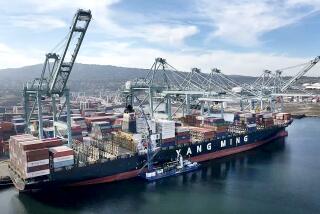Smith Says It May Face Defaulting on Its Debt
- Share via
Smith International, which last week was ordered to pay at least $207 million for infringing a drilling bit patent, said Tuesday that the award may cause it to default on agreements covering about $260 million of its borrowings.
The troubled Newport Beach-based maker of oil field equipment said that amount represents the bulk of its debt. As of June 30, Smith had $173.4 million in long-term borrowings and $118.5 million in short-term debt. In a statement, the company said it is meeting with creditors to discuss the “implications of the proposed . . . judgment with respect to various debt agreements.”
The company did not specify which covenants in its lending agreements it may be in jeopardy of violating. Typically, lenders require corporate borrowers to maintain certain levels of net worth or profitability, for example, as part of their loan arrangement.
Several securities analysts speculated that the announcement by Smith may signal a step toward filing a petition for protection from creditors under Chapter 11 of the U.S. Bankruptcy Code. Chapter 11 allows a debtor time to reorganize its finances and develop a plan to repay its creditors.
On Friday, U.S. District Judge Harry L. Hupp in Los Angeles ordered Smith to pay Houston-based Hughes Tool royalties and interest that will total between $207 million and $228 million, bringing to a close a 14-year legal battle over a patented rubber seal used in rock drilling bits.
Although the award is considerably less than the $1.2 billion that Hughes sought following a federal appeals court ruling three years ago that Smith had infringed on Hughes’ patent for the seal, the judgment still is more than Smith was prepared to pay.
“We are disappointed that the court did not accept our position that the damages should be significantly lower,” Smith Chairman Jerry W. Neely said in Tuesday’s statement.
Hupp is expected to issue a written ruling next week, but he verbally held Smith liable for a 10% royalty equal to about $130 million. The remainder of the award consists of interest on the $130 million, computed at the average interest rate on AAA-rated corporate bonds since 1972.
Smith contends that the total amount will be $207 million, while Hughes officials have said they expect the final award to be $228 million.
Hupp did not award punitive damages, however, saying there was no bad faith or willful infringement on Smith’s part.
During the third quarter of last year, Smith set aside a $27.8-million reserve in anticipation of the award. The actual award is nearly quadruple what several analysts said Smith could afford to pay.
A default on debt, even a technical one, “is something which frequently happens with companies which subsequently file for bankruptcy,” said Herbert Hart, an oil industry analyst for the San Francisco brokerage house of S. G. Warburg, Rowe & Pitman, Akroyd. “It puts (investors) on warning that they may elect at some stage to go into Chapter 11.”
Although Smith officials have not been available to comment on whether they plan to appeal the ruling or file for bankruptcy protection, analysts say that seeking protection gives Smith critical time to negotiate a settlement with Hughes, its arch-competitor.
“I think it’s a clear signal to Hughes that Smith is not going to pay cash, and it may be a clear signal that they are going to file,” remarked Kevin Simpson, an analyst with the New York investment firm of Drexel Burnham Lambert.
And, as if betting on a Smith bankruptcy, investors Tuesday jettisoned Smith shares. On the New York Stock Exchange, Smith stock hit a low of $1.875 a share at one point before rebounding slightly to close at $2.125, down 87.5 cents from Friday’s close. Volume was a heavy 1.76 million shares.
Smith previously reported a loss of $58.3 million for the nine months ended Sept. 31, compared to net earnings of $7.5 million a year earlier. Revenue during the first nine months of 1985 slid to $524.9 million from $545.2 million during 1984.
More to Read
Inside the business of entertainment
The Wide Shot brings you news, analysis and insights on everything from streaming wars to production — and what it all means for the future.
You may occasionally receive promotional content from the Los Angeles Times.









